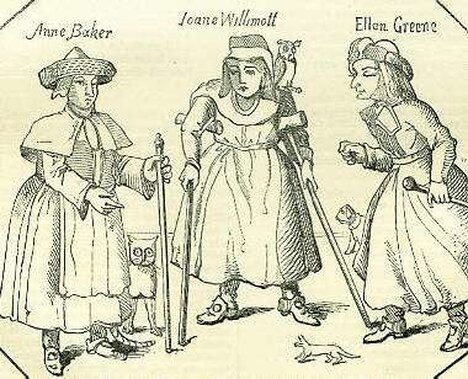|
Riven by Rumour The Witches of Belvoir Cunning women, they sooth agues and palsies, ease painful birth with raspberry leaves and camomile, meadowsweet and feverfew, lavender and rue. Then a sickness persists, a purge fails. A baby dies. How can that be? A cow sickens, crops are blasted. How can that be? A woman is barren, a neighbour miscarries. How can that be? Whispers, grudges, neighbours’ feuds festering, a village riven by rumour. Elizabeth Hough, dead, bewitched by Anne Baker, For giving her almes of her second bread. The Fairbairn child, dead of Plannett sickness. John Patchett’s wife and new born babe death stricken. Wicked practises, sorcerye. Fear. Gossip takes on ingenious spite. Sprites are seen, black imps, a fiend. Malice and vengeance, old scores to be settled. Malevolent taunts become malignant. Hearsay, whispers, a curse uttered in anger, a gesture, insult. See, Mistress Baker keeps poisons in those jars, potions of hemlock, aconite, belladonna, stinking tisanes and steaming brews. Her only defence is conjuring fear in her tormentors. Children run, screaming, to their mothers. Dogs are set on her. There is talk of nail parings, blood, hair, wool from a marriage bed, a stolen glove pricked, dipped in water, rubbed on the belly of a cat. The Earl of Rutland’s sons dead in their beds, and my lady sickens. Wicked practises and sorcery. They come for Joan Flower and her daughters. Whipped through the streets, wrists twisted, a rope through the mouth, bridled, manacled, shackled. Look, the devil’s teat, a claw mark, see, an incubus. Devil’s whore. Broken, they stand before Francis, Lord Willoughby, Sir George Manners, Sir William Pelhorn, Sir Henry Hastings, Samuel Fleming, and Divers others of His Majesty’s Justices of the Peace. No-one to speak for the women, their voices querulous one minute, defiant bravura the next. Pinioned in a dank cell, confessions, recantations. Silence is recalcitrance. Unbiddable women must be constrained, made an example of. At Lincoln Gaol, Margaret and Phillipa Flower appear before Sir Henry Hobbert, Chief Justice of the Common Pleas, and Sir Edward Bromley, Baron of the Exchequer. They are no match for their inquisitors’ tricksy sophistry, the witty word fencing of slick tongued lawyers at ease with the parlance of law and state. In a climate of witch fervour, a rabble baying for blood there is the rack. Torture by water. Confessions. Hanging. A gibbet casts a long shadow, a legacy of fear. Those fearing witchcraft carry an amulet, a charm, prophylactics, bury Bellarmine bottles as counter magic. Those fearing accusation lock their doors and keep their silence. Sue Mackrell Author's note: "In 1619 three women from the Vale of Belvoir, on the Leicestershire/Nottinghamshire border were accused of witchcraft. Margaret and Phillipa Flower were hanged at Lincoln Castle. Their mother Joan died on her way to the trial. During their ‘examination’ the sisters revealed the names of other women who had aided them: Anne Baker; Joan Willimot, and Ellen Greene." Words in italics are from the transcript of the trial. Of London-Welsh origins, Sue Mackrell has an MA (Distinction) in Creative Writing from Loughborough University UK, and has taught in universities and FE colleges. She has worked on a range of Arts Council, Heritage England and Heritage Lottery funded projects writing about those in history whose stories have been hidden or suppressed. Her poetry has appeared regularly in Agenda -https://www.agendapoetry.co.uk/ as well as in a range of print and online publications.
0 Comments
Your comment will be posted after it is approved.
Leave a Reply. |
The Ekphrastic Review
COOKIES/PRIVACY
This site uses cookies to deliver your best navigation experience this time and next. Continuing here means you consent to cookies. Thank you. Join us on Facebook:
July 2024
|




